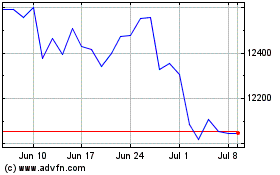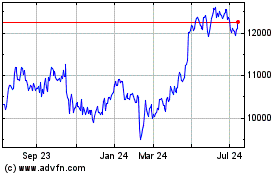India Approves Use of Oxford-AstraZeneca's Covid-19 Vaccine
January 02 2021 - 11:22AM
Dow Jones News
By Vibhuti Agarwal and Eric Bellman
NEW DELHI -- India has authorized the Covid-19 vaccine from the
University of Oxford and AstraZeneca PLC, kick-starting global use
of an inoculation that is expected to be embraced by developing
countries given its lower price and ease of transport compared with
other front-runners.
India's information and broadcasting minister, Prakash
Javadekar, said Saturday that the vaccine, which was developed in
the U.K., has received permission for emergency usage.
"Last year began with corona. This year has begun with a
vaccine," he said at a news briefing in New Delhi on Saturday.
The U.K. authorized the vaccine earlier this week, and India is
one of the first countries to follow suit.
The Oxford-AstraZeneca vaccine could be a good fit for India and
other developing countries thanks to its price, convenience and
expected global reach. AstraZeneca has promised to make as many as
three billion doses available in 2021 -- more than any other
Covid-19 vaccine maker -- and at a cheaper price.
The U.K. company says it won't profit from the shot during the
pandemic, or ever in the case of poorer countries.
The vaccine can be transported and stored for months with normal
refrigeration, making it easier to distribute in places where
people and health-care networks are overstretched and underfunded.
Many of the other leading Western vaccines require ultracold
temperatures for all but a few days or weeks.
India has already been building its vaccine delivery network and
over the weekend did a dry run in some states to test it. Its first
wave of vaccinations will piggyback on its nationwide network for
vaccinating children, which is one of the largest in the world.
That network reaches all across the South Asian nation but doesn't
have readily available the freezers or transport equipment needed
to handle the vaccines that require extremely cold
temperatures.
In India, AstraZeneca has a manufacturing and distribution
agreement with the Serum Institute of India to provide more than
one billion doses to developing countries. The institute is already
the world's largest vaccine maker by volume, making more than a
billion doses a year for everything from polio to measles, mostly
for export to emerging markets.
Confident the Oxford-AstraZeneca vaccine would get approval, SII
has been making and stockpiling it and already has close to 50
million doses ready. It hasn't said how much of that would be for
India, but in the past it said it expected that eventually around
half of its production would be for domestic use.
While India's early approval and the Serum Institute's stockpile
will speed up the process, a nationwide rollout will still take
time. Richer, less populated countries are already struggling with
the logistics. India plans to deliver more than 300 million doses
in the next six months, to start to make a dent in its population
of more than 1.3 billion people.
The vaccine takes two shots, and British health officials
recommend a delay of as long as three months between each dose.
Similar guidance applies to the vaccines developed by Pfizer Inc.
and BioNTech SE that the U.K. authorized earlier in December. The
Pfizer-BioNTech shot and one developed by Moderna Inc. have also
been cleared in the U.S.
India is in need of an affordable, easy-to-distribute vaccine,
given that more than 10 million Indians have been confirmed to have
been infected, second only to the U.S. While its daily infection
rate has plunged in the past few months, it is still getting about
20,000 new infections and more than 200 deaths each day.
Meanwhile in the six months through September, India's gross
domestic product contracted more than 15% from a year earlier. The
government wants a vaccine to end fear of the coronavirus and allow
the economy to rebound to create more and better jobs for its young
population.
Write to Vibhuti Agarwal at vibhuti.agarwal@wsj.com and Eric
Bellman at eric.bellman@wsj.com
(END) Dow Jones Newswires
January 02, 2021 11:07 ET (16:07 GMT)
Copyright (c) 2021 Dow Jones & Company, Inc.
Astrazeneca (LSE:AZN)
Historical Stock Chart
From Mar 2024 to Apr 2024

Astrazeneca (LSE:AZN)
Historical Stock Chart
From Apr 2023 to Apr 2024
